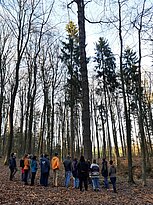Latest News
The discussion about insect decline continues... two new contributions published!
Weather explains the decline and rise of insect biomass over 34 years/Weather anomalies cannot explain insect decline
Discussion about our Nature article (https://www.nature.com/articles/s41586-023-06402-z) is continued by two additional contributions:
https://www.nature.com/articles/s41586-024-08528-0.pdf
BETA_FOR Meeting in Lüneburg
The members of BETA-FOR held a meeting at the Leuphana University in Lüneburg in March 2025, which included an excursion to the Lübeck community forest.
A regular exchange of ideas is inspiring! This is the reason that members of the BETA-FOR-Projekt hold recurring meetings, to communicate the status of subprojects, coordinate future plans and directions, and to develop creative ideas. Another important part of this meeting is an excursion. We attended the latest BETA-FOR workshop this past March at the Leuphana University of Lüneburg and were able to visit the renowned Lübeck community forest during a beautiful spring day for the excursion. There we learned about the Lübeck forestry concept, which focuses on harmonizing forestry and nature. Thank you to the organizers, our hosts in Lüneburg and all participants for a great meeting!
Toxin analyzes on the Galápagos islands
As part of her doctoral thesis, Würzburg doctoral student Kirtana Kumar is examining various species of lava lizards and leaf geckos on the Galápagos Islands (Ecuador) for toxin contamination. To eradicate invasive species such as rodents and cats, poison bait was dropped in December 2023. Kirtana Kumar wants to examine not only the impact on the population of lizards and geckos due to the disappearance of predators, but also the route of the poison through the island's food web and the soundscape of the native birds after the eradication campaign.Read here the full press release of the University of Würzburg.
Beta-For Team Explores Biodiversity Insights in Hunsrück-Hochwald National Park
Last week, the Beta-For team gathered in Hunsrück-Hochwald National Park. Researchers presented their findings, engaging in discussions on forest structure, soil analysis, and biodiversity. International experts such as Prof. Dr. Diana Six, Prof. Dr. Fons van der Plas, and Dr. Keita Nishizawa illuminated the diversity of forest research with captivating presentations. The symposium ended with an excursion through the national park, providing insights into management tasks and challenges.
More information: Symposium im Nationalpark Hunsrück- Hochwald
AI Models Identify Biodiversity in Tropical Rainforests
Animal sounds are a very good indicator of biodiversity in tropical reforestation areas. Researchers led by Würzburg Professor Jörg Müller demonstrate this by using sound recordings and AI models. Press Release University of Würzburg
Beta-FOR Workshop
The highlight of the Beta-FOR workshop was undoubtedly the visit and intense exchange with the renowned scientist Prof. Dr. Anne Chao, who participated in the workshop as a Mercator Fellow. Anne Chao conducted a statistics seminar on the topic of Beta-diversity and presented valuable analysis methods for previously collected data. Furthermore, she emphasized the importance of collaborations and open cooperation in science, and ignited the enthusiasm for research in all participants!
A heartfelt thanks also goes to all the doctoral candidates who presented the progress of their sub-projects and delved into discussions!
Nature Publication: Important Additional Driver of Insect Decline Identified
Combinations of unfavourable weather conditions over several years can cause a decline in insect biomass. This is shown by a study published in "Nature" by a team led by Professor Jörg Müller. A summary of the article can be read in the press release of the University of Würzburg.
Radio interview with Christian von Hoermann: Dead animals should stay in the forest
Discover the unusual debate about the role of dead animals in the forest! In our fascinating audio, learn why some experts argue that dead animals should stay in the forest. Delve into the world of ecology and conservation and learn how this unconventional perspective can affect wildlife and the forest. More information: Audio report from SWR.

Vultures in the Eifel
In cooperation with several German national parks, researcher Dr. Christian von Hoermann from the University of Würzburg is investigating the role of carrion in our ecosystems. Unusual guests in the Eifel National Park recently witnessed the success of the project. Prof. Jörg Müller is also looking forward to the carrion project: "One can see that nature is ready for more process protection; it often depends on us." More information: University of Würzburg press release.
Beetles and their biodiversity in dead wood
What type of energy promotes the biodiversity of beetles living in deadwood in the forest?
This question is explored by Peter Kriegel and researchers in a specialized article in the journal "Ecology Letters," and they have shown that it depends on where the beetles are in the food chain. More information: University of Würzburg press release

Increased monitoring of forests
Increasing heat and drought are changing forests faster than expected. Together with researchers from the University of Würzburg, Prof. Dr. Jörg Müller aims to monitor this dynamic more closely. They have secured 1.2 million euros for their project. More information: University of Würzburg press release

Congratulations Jana!
Our doctoral student Jana Englmeier successfully defended her doctoral thesis titled "Consequences of climate change and land-use intensification for decomposer communities and decomposition processes." More information about Jana's work can be found in the LandKlif project or in the recently published specialized article in the journal "Ecography."

Uniwald Sailershausen: Wildcat falls into BETA-FOR photo trap
Whether it is really a wildcat cannot be seen with one hundred percent certainty on photos - but the thick tail and the strong eel line are strong indicators.
21-25.11.2022 - GfÖ Conference
For many of us, GfÖ 2022 in Metz was the first major conference that impressed everyone with its fantastic topics and organization!
From our group, Ruth Pickert and Peter Kriegel gave exciting presentations on their doctoral topics. In addition to these two presentations, the Ecological Station was also represented with two poster presentations by Sophia Hochrein and Oliver Mitesser.

12.-15.10.2022 - BETA-FOR Workshop
Our first official BETA-FOR workshop was a huge success!
The first BETA-FOR workshop was a great opportunity for all members to get to know each other, present projects and exchange information about the recently completed field season. Special impulses were given by the Mercator Fellows with exciting presentations on statistical methods of biodiversity analyses and impressive research data on multidiversity and multifunctionality of forests.

BETA-FOR in the Frankenschau: Bats, butterflies, frogs and co.
Contribution to the Frankenschau: Our BETA-FOR scientists Clara Wild and Julia Rothacher report on their research in the University Forest Sailershausen. The team led by project leader Prof. Jörg Müller aims to determine how biodiversity in local forests can be preserved and promoted.
13.07.2020 - Welcome: New Postdoc Dr. Mari-Liis Viljur
Dr. Mari-Liis Viljur joins the team of the Fabrikschleichach Ecological Station for the next 3 years. After her dissertation on "Local and landscape effects on butterfly assemblages in managed forests" in 2019 at the University of Tartu (Estonia), she will now focus on different species groups in deadwood decomposition. We extend a warm welcome to her: Tere tulemast!
22.10.2019 - Nature park discovery day with the kindergarten Sankt Josef from Kirchaich and the nature park rangers
Together with the nature park rangers, Jana Englmeier and Sophia Hochrein from the Ecological Station organized an autumn Nature Park Discovery Day for the children of the St. Josef Kindergarten in Kirchaich. At Wotansborn near Fabrikschleichach, they discovered spiders, beetles, bugs, flies, and other insects, closely observing them with the help of magnifying cups. They also eagerly searched for and studied mushrooms, deadwood, and plants. As a highlight, they even found fire salamanders near the spring. Several regional newspapers reported on this event.

10.07.2019 - Prof. Anne Chao and Prof. Chun-Huo Chiu as guests
The Ecological Station welcomes Prof. Anne Chao and Prof. Chun-Huo Chiu as guests at the station. The internationally renowned statisticians from Taiwan used the time to inform themselves about the ongoing projects of the Ecological Station. Together with the team of the station they visited different experiments in the University Forestry Office Sailershausen and in the Bavarian Forest National Park. Many fruitful discussions are expected to further intensify the scientific cooperation between the participating institutions.
01.01.2019 - Welcome: Visiting Scientist Dr. Alexandro B. Leverkus
Dr. Alexandro B. Leverkus from the Universidad de Alcala (Madrid) was a guest at the Ecological Station Fabrikschleichach, Zoology III, as an Alexander von Humboldt Research Fellow from January 1, 2019, to December 31, 2020. During this time, Leverkus conducted research on the topic "Forest disturbances in the Anthropocene: Unraveling ecological interactions between wildfire and (salvage) logging."
17.03.2018 - Unique deadwood project in regional newspaper.
With 42 tree species, the deadwood project on biodiversity in the Bad Windsheim Forest is unique. This project has been reported in the Bad Windsheimer Zeitung. Doctoral candidate Sebastian Vogel is investigating not only the tree species aspect but also the influence of sunlight on deadwood-associated beetles, spiders, and fungi.
22.02.2018 - The station congratulates Dr. Thorn on receiving the 2018 Gregor Louisoder Environmental Foundation Science Award.
Dr. Simon Thorn received the Gregor Louisoder Environmental Foundation's Grant for his dissertation, "Effects of salvage logging on biodiversity – Ecological evidence for conservation-oriented management of natural disturbances."
02.12.2017 - Radio Interview with Prof. Müller on Deutschlandfunk
In the radio interview on the topic "Primeval Forest or Timber Plantation: Does the Forest Need to Become Wilder," Prof. Müller, an expert and advocate for more wilderness, engages in a discussion with Prof. Knoke from TU Munich about the future use of forests. In the Deutschlandfunk interview, he emphasizes the importance of setting aside forests from commercial use to enhance biodiversity.
22.08.2016 - Coverage of deadwood project in Der Spiegel
To explore how biodiversity of deadwood-dwelling species in commercial forests can be promoted, the Bavarian Forest National Park, in collaboration with the University of Marburg, initiated the Bioholz Project. This project investigates, among other aspects, how trees can be artificially induced to die in order to maintain/support biodiversity. The Spiegel recently provided extensive coverage of the project in an article.
01.05.2016 - Prof. Dr. Jörg Müller new head of the Ecological Station
Since the beginning of May, the Ecological Station in Fabrikschleichach, under the leadership of Prof. Dr. Jörg Müller, has been collaborating closely with the Bavarian Forest National Park. Prof. Müller aims to establish a new focus on researching the biodiversity of temperate forest ecosystems.














